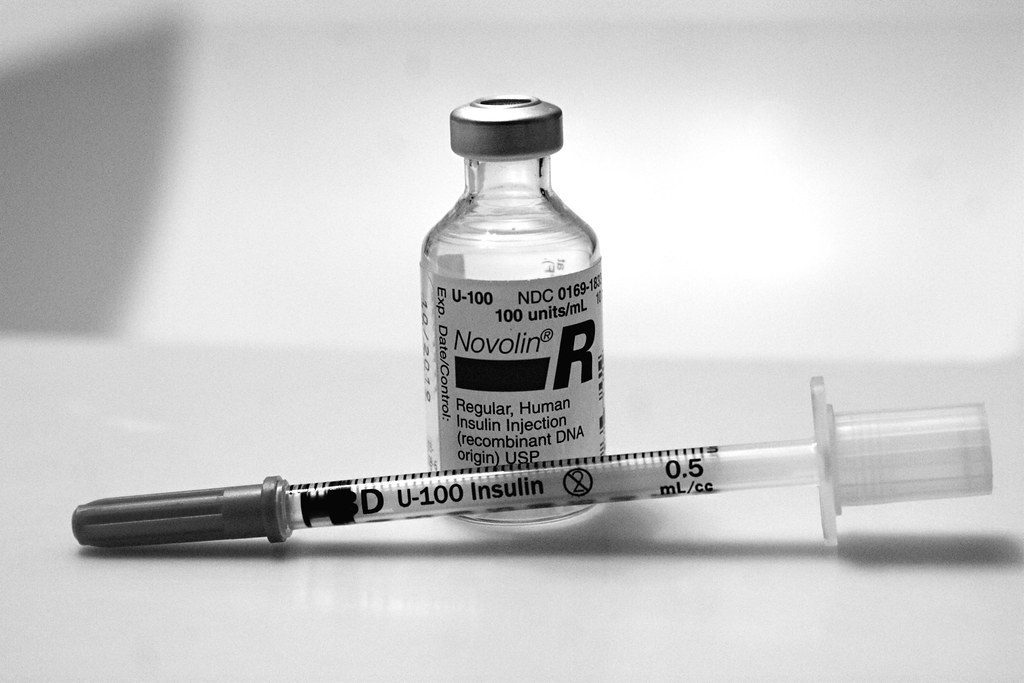Students demand a cap on insulin prices ahead of World Diabetes Day
Students gathered on Cross Campus to protest the price of insulin and call for Congress to pass the bipartisan INSULIN act.

Wikimedia Commons
Yale students gathered on Cross Campus on Sunday to rally in support of “Insulin for All,” a movement seeking to place a cap on insulin prices.
Arden Parrish ’25, the founder of Yale’s chapter of the “Diabetes Link,” organized the rally in anticipation of World Diabetes Day, observed on Nov. 14. A few minutes into the rally, a crowd had assembled around Parrish, who spoke into a microphone on the steps of Sterling Memorial Library. Students held up homemade signs with slogans like “Patients over profit,” “Insulin is a human right” and “Health is wealth.”
“Insulin costs 49 cents a vial to produce, yet I pay $300 a vial with insurance,” Parrish told the News. “It’s inhumane. I’ve known people who have had to ration it, and I myself have rationed it. I’ve known people who have died from rationing it.”
Rationing insulin is the practice of underusing the prescribed dosage needed to maintain safe levels of blood glucose. It can result in a deadly condition known as diabetic ketoacidosis.
A 2022 report found that an estimated 1.3 million adults with diabetes rationed insulin in the past year, making up 16.5 percent of all diabetes related insulin prescriptions.
Parrish, who was diagnosed with Type 1 diabetes at the age of seven, was forced to ration insulin in high school after their father lost his job.
“Eight doses a day was suddenly cut to two,” they said. “Losing your job means losing your insurance, and we live in a country where losing your insurance can mean losing your life.”
In 2020, 49 percent of Americans received health insurance through their employers. Roughly 10 percent were left uninsured.
Spencer Greenfield ’25 attended the event in support of reducing insulin prices.
“Healthcare is broken in this country,” Greenfield told the News. “I’m a fundamental believer in healthcare as a human right, so the bare minimum they could do is put a price cap on it, but ideally it should be provided for free.”
Parrish expressed frustration with Congress’s inaction regarding the insulin affordability crisis. They reflected on a time they testified in front of a Senate panel expressing support for capping insulin prices, but were “unable to actually get it done.”
Tony Li ’26, who is not diabetic, saw a flyer for the rally and decided to attend.
According to Li, “This is a cause you should advocate for regardless of if you have diabetes or where you stand politically. The price of insulin is way too high considering what it costs to make.”
World Diabetes Day is observed in commemoration of the birthdate of Dr. Frederick Banting, who discovered insulin and its applications in 1923. Notable for his refusal to put his name on the patent, Banting declared, “Insulin does not belong to me, it belongs to the world.” The patent was sold to the University of Toronto for one dollar.
Coincidentally, the rally was held a day after insulin producer Eli Lilly saw a five percent drop in its stock price after a fake tweet announcing that “insulin is now free” went viral. Eli Lilly released an apology for the message, drawing criticism from many.
“We have been demanding apologies from [Eli Lilly] for years, apologies for our friends and loved ones who have died due to their criminal inaction, and instead they apologize for a tweet that lowered their stock price,” Parrish said.
In June, Sen. Jeanne Shaheen, D-N.H., and Susan Collins, R-Maine, proposed a bipartisan “Improving Needed Safeguards for Users of Lifesaving Insulin Now (INSULIN) Act,” which would cap insurance co-pays at $35 a month. The act has yet to be put to a vote.
Parrish expressed support for the INSULIN Act while commenting on their personal experience lobbying before congress.
“I was young enough to be surprised when it didn’t pass, old enough to know better,” Parrish said. “This is a long fight. And we are taking it one step at a time.”
Shaheen and Collins proposed the INSULIN Act in June of this year.







